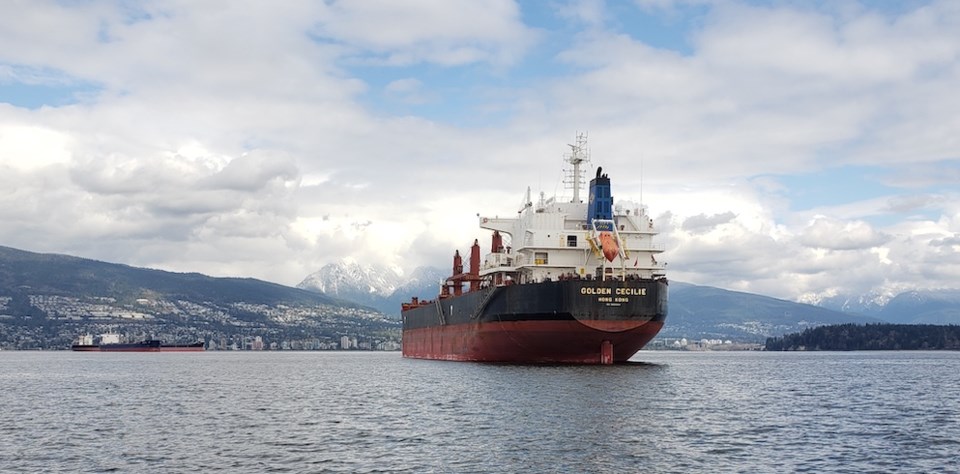A collision last week between two freighters anchored near the Southern Gulf Islands is renewing calls for stricter regulation of the use of roughly 30 designated anchorage points throughout the Strait of Georgia.
During rough weather and strong winds, one vessel’s anchor gave way in Plumper Sound and it drifted a distance to collide with another, leaving a large hole in one ship.
Peter Luckham, chair of the Islands Trust council, said the incident highlights a problem that some Gulf Island residents have been concerned about for years.
“We think of this as a very near miss to a situation where literally millions of litres of bunker fuel oil could have become spilled onto the coast,” Luckham said.
The anchorages are used by freighters from around the world while they wait to receive their cargo at the Port of Vancouver and during inclement weather, and vessels are free to anchor temporarily wherever it’s safe, says Transport Canada. According to the agency, the average stay at anchorage points around the southern Gulf Islands is 8.6 days.
Luckham said some vessels end up waiting weeks at anchorage points due to uncertain timelines for cargo pickups. “The use of anchorages for long-term parking is just unsafe and not necessary if proper management of the vessel capacity within the port [of Vancouver] was managed differently,” he said.
Luckham said he recognizes that shipping is a fundamental part of the country’s economy, but he wants to see a higher level of oversight to ensure vessels don’t arrive in the area weeks before their shipment is ready and spend that time waiting at anchorage points.
In addition to concerns about vessels colliding or running aground and spilling oil, advocacy groups are worried about acoustic interference with orcas, pollution from diesel generators and anchor chains scouring the ocean floor.
Robert Lewis-Manning, president and CEO of the Vancouver-based Chamber of Shipping, a marine-industry association, said the chamber is working with the federal government on a plan to better manage and monitor anchorages.
“Ultimately, you want to reduce the amount of time it takes a cargo to get from where it’s produced — let’s say a farm in Saskatchewan — to the vessel to wherever it’s exported to.”
In the past six months, the industry has faced significant challenges. A railway strike in November, followed by a mudslide in December, an avalanche in January, railway and port protests in February and now COVID-19 have created “a fairly horrendous period for Canada’s supply chain,” Lewis-Manning said.
He said the plan the chamber is working on with the federal government could include establishing anchorages in other locations to reduce the concentration around the Southern Gulf Islands.
“That’s ultimately the goal. It’s been very slow to get there,” he said.
Transport Canada said in an emailed statement that it’s aware of the concerns and gathered stakeholders in early 2018 to implement voluntary measures to mitigate noise and lighting nuisances.



